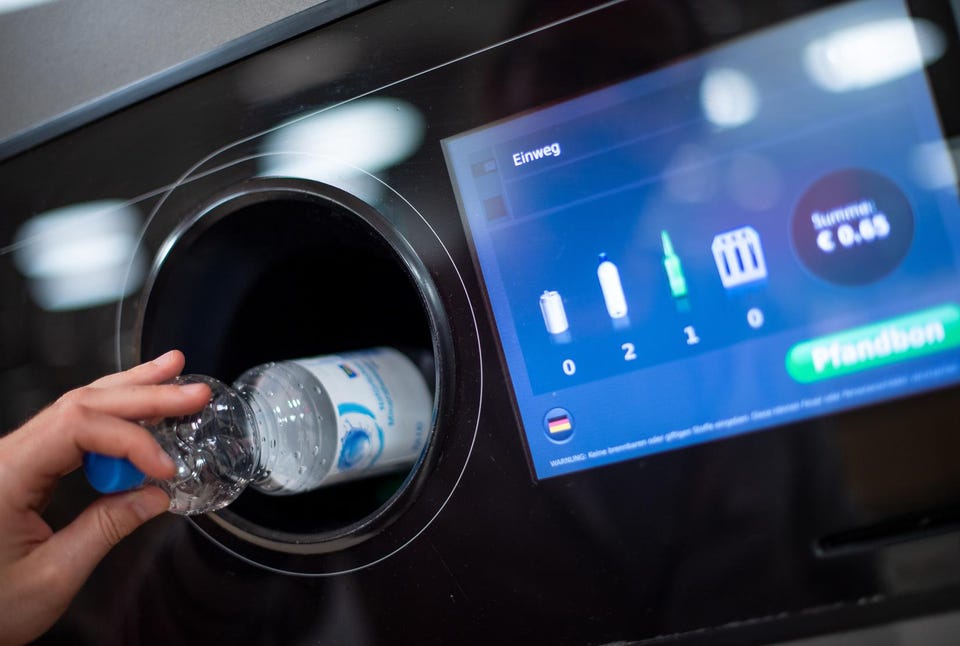Plans For A U.K. Plastic Bottle Deposit Return Scheme Step Closer To Reality


08 April 2019, Berlin: A man puts a deposit bottle into a deposit bottle machine in a supermarket. … [+] Photo: Monika Skolimowska/dpa-Zentralbild/ZB (Photo by Monika Skolimowska/picture alliance via Getty Images)
picture alliance via Getty Images
After many years of delay, plans for a deposit return scheme in the U.K. for plastic bottles and cans are now moving a step closer.
The Department for Environment, Food and Rural Affairs (Defra) today announced plans for a scheme that will run in England, Wales and Northern Ireland from 2025 onwards.
The proposed scheme will include reverse vending machines and designated sites, where people can deposit plastic bottles and cans in return for cash.
According to Defra, the scheme aims to ensure 85% fewer drinks containers are discarded as litter within three years of its launch.
Environment minister Rebecca Pow said it will provide a “simple and effective system across the country” that will help people recycle more easily.
However, the scheme Defra announced today will not cover glass bottles.
And it does not cover Scotland, where the Scottish Government is set to launch its own deposit return scheme in August this year.
The Scottish scheme does include glass bottles, along with plastic and cans.
Deposit return schemes are already up and running in many countries around the world. Germany has the highest-performing one in the world, achieving a 98% return rate for drink containers.
Today’s announcement has been a long time coming, particularly for campaigners and those working in the U.K.’s recycling and drinks industry.
The-then environment secretary Michael Gove first announced plans in March 2018, subject to a consultation later that year.
Every year, Brits go through 14 billion plastic links bottles and nine billion cans, many of which are thrown away as litter or end up in landfill.
The new plans were welcomed by the vice-president of operations at Coca-Cola in Great Britain and Ireland, Dusan Stojankic, who said it will work closely with officials, retailers and other drinks manufacturers to ensure it is “easy for customers to use”.
But Libby Peake, head of resource policy at Green Alliance, said the new plan was late and “will only add to consumer confusion”.
The chair of the environmental audit select committee, Philip Dunne, said it was disappointing to learn that the scheme will not come in until 2025, given the length of time “the government has spent pondering the issue”.
Dunne also noted that U.K. recycling rates have “plateaued” in recent years and added the new scheme needs to play a significant part in raising them up again.
He also urged ministers to work with the Scottish scheme operators to ensure the two programmes are as compatible and interoperable as possible.
The Recycling Association chief executive Simon Ellin warned local authorities and their contractors could miss out on valuable resources from households, if drinks cans and plastic bottles get “cherry-picked” by the new system.
And the founder of the non-profit Planet Patrol, Lizzie Carr said she was pleased the scheme is now finally moving forward.
But she added it was “incredibly disappointing” to see glass bottles excluded, in direct contrast to Scotland’s approach, which includes them.
She said Planet Patrol’s data, collected by its volunteers, has consistently shown glass bottles make up between three and five per cent of litter found.
By including this material in Defra’s scheme, she said thousands, if not millions, of glass bottles that would otherwise be lost could be saved.
“After all, isn’t that the entire point of the scheme to prevent litter in our environment and encourage circular solutions across all materials?” Carr told Forbes.
